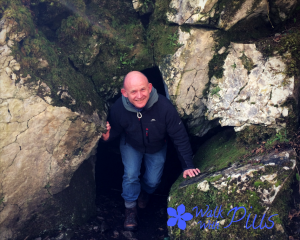Eagle’s Rock, Slieve Carran – A Burren Walk
A visit to Colman’s Hermitage at Eagle’s Rock, Slieve Carran, in the Burren National Park, is a visit to one of the great sacred sites located in the Burren & Cliffs of Moher Geopark. Along the magnificent Wild Atlantic Way, this walk is a must on every visitors schedule.
Colman, the holy man associated with this spiritual oasis, was a hermit here from AD597 -604. (Click here for a brief biography of Colman) The hermitage has three features, which are of interest.
The cave is known locally as Colman’s Bed. It is said that Colman slept in the cave for seven years, while living the ascetic life of an early Christian hermit.

Colman’s Bed, Slieve Carran, Burren National Park
The holy well, with a cure for eye ailments, is known as Colman’s Well. It is a spring well, with cool, clear, crystal water emerging from the limestone at the cliff base, under Slieve Carran.

Colman’s Well, Slieve Carran, Burren National Park
The little chapel, which dates to the 10th. century and is one of the oldest ecclesiastical ruins in the Burren, is called Colman’s Oratory. It is an excellent example of cyclopian masonry common in North Clare and South Galway in that period.Local tradition has it that Colman’s simple cell was where the oratory is located.

Colman’s Oratory, Slieve Carran, Burren National Park. Picture taken February 2018 in snow covered landscape.
Poet David Whyte, who, with John O’ Donohue, visited Colman’s Hermitage annually, on their Celtic Pilgrimage to the Burren, has written an amazing poem entitled “Coleman’s Bed” about the spiritual experience of visiting this most sacred of sites. Click here to listen to the poem.
Nearby is the legendary “Road of the Dishes” which is part of the imprint culture/evidence in the landscape of Colman’s stay at Eagle’s Rock. The story of the “Road of the Dishes” recounts how Colman met King Guaire the Generous and how Colman’s life as a hermit ended 1,414 years ago. At Guaire’s prompting, Colman founded the monastic settlement of Kilmacduagh c.AD610.
A walk to Eagle’s Rock during the summer months is an opportunity to view the delightful array of Burren flora, to connect with nature and walk in the footsteps of our ancestors.
“Everything in the universe is within you. Ask all from yourself”. Rumi




